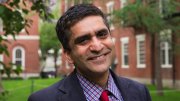Rakesh Khurana announced Thursday that he is stepping down next June, making the 2024-25 academic year his last as dean of Harvard College. In a letter addressed to the University community, Khurana revealed that he had initially intended to depart this summer, but changed his plans.
“A year ago, I was prepared to make this announcement as I began the final year of my second term and what at the time I believed would be the closing chapter of my deanship,” Khurana wrote. “However, fate had different plans, and at the request of senior leadership, I agreed to remain for an additional year to support transitions at the University.”
In a separate letter, Hopi Hoekstra, Dean of the Faculty of Arts and Sciences, announced that she would launch the search for Khurana’s successor soon, with the help of a faculty advisory committee. Hoekstra also said she would solicit input during the process from students, staff, faculty, and alumni. “I hope that you will be willing to share your insights and perspectives in this process, as we have big shoes to fill,” she wrote.
Khurana, appointed in 2014, is the longest-serving dean of the College in a century. From 2010 to 2020, he also served as faculty dean of Cabot House. After his departure from the dean’s office, he will remain on Harvard’s faculty, according to University spokesperson Jonathan Palumbo. Khurana is a professor of sociology and Bower professor of leadership development at Harvard Business School.
In the decade since becoming dean, Khurana helped steer the institution through periods of significant turbulence, including the COVID-19 pandemic and last year’s upheavals in the wake of the Israel-Gaza war. Last year, he facilitated the formation of an “Intellectual Vitality Committee” of students, alumni, and faculty members to discuss the issue of the free exchange of ideas on campus; that committee became part of a wider University discussion of free speech. Pointing to these efforts—as well as the undergraduate student body’s growing diversity during his tenure—Hoekstra called Khurana’s “commitment to inclusion” a “hallmark” of his deanship.
In his letter, Khurana praised the College, “this vibrant, dynamic, and diverse community,” as “truly the heart” of the University. Echoing the sentiment from President Alan M. Garber’s welcome letter sent earlier in the day, he also urged caution and collaboration: “Institutions often seem as though they will endure forever, but we must not take for granted the stability and strength of this great university, and the depth of talent we have assembled,” he wrote. “As one of our nation's oldest and most renowned institutions, Harvard is not immune from the forces that lead to institutional decline—complacency, risk avoidance, protecting our reputation at the expense of our values.”
Later in the letter, he added, “As someone whose scholarship and teaching has centered on institutions, leadership, and governance, I know as well as anyone that institutions are bigger than any individual. Nurturing this institution is a team effort, and we are all caretakers of a legacy, entrusted with the responsibility to protect and strengthen it for those who come after us.”
Read Dean Khurana’s complete statement here.
[Update, August 29, 2024: an earlier version of this story stated that the upheavals on campus last year affected Khurana’s decision to delay his departure as dean. A University spokesperson notes that Khurana’s decision was made at the start of the 2023-24 academic year.]









